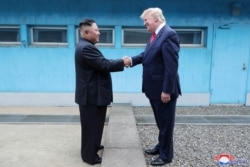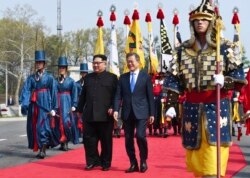It was a relatively modest step: South Korea would relay birthday greetings from U.S. President Donald Trump to North Korean leader Kim Jong Un, who turned 36 last week.
Even if it was not likely to lead to a breakthrough in U.S.-North Korea talks that have been frozen for months, South Korea's decision to pass on the message could help prove the negotiations are not dead and possibly revive Seoul’s role as a mediator.
It didn’t work as planned. North Korea’s foreign ministry on Saturday said it already received the birthday message and lashed out at Seoul’s “presumptuous” attempt to “meddle in the personal relations” between Trump and Kim.
The statement, delivered by senior diplomat Kim Kye Gwan, mocked South Korea for still holding onto its “lingering hope for playing the role of ‘mediator.’”
The biting tone of Kim’s remarks is difficult to convey in English, says Kim Jeong-min, who covers the Koreas for the Seoul-based NK News, a North Korea-focused publication. “
But it sounds something similar to ‘Trump and Kim are better friends than you guys and your fear of missing out is laughable,'” she says.
Mocked, ignored
It’s the type of scenario that has played out repeatedly over the past year, as South Korean President Moon Jae-in makes peace overtures to the North, only to be at best ignored and at worst humiliated by North Korean officials.
It is a severe disappointment for Moon, whose outreach to Kim helped smooth the path for the first Trump-Kim summit in June 2018. “
I think the Moon government is (acting) out in desperation to save his peace engagement policy, which was envisioned to be his legacy,” says Hoo Chiew-ping, a Malaysia-based Korea specialist. “That legacy is now in ruins."
Moon and Kim held three summits in 2018, agreeing to a series of economic and military cooperation projects that Moon hoped could build trust and eventually become the first phase in the long process of reunifying the two Koreas.
But Moon has been unable to implement most of those agreements, largely because of United States and United Nations sanctions imposed on North Korea over its nuclear weapons program.
With nuclear talks stalled, North Korea has blasted the South's unwillingness to move ahead, accusing Seoul of prioritizing its relationship with Washington over Pyongyang.
Will Moon push ahead regardless?
Ahead of South Korea’s parliamentary elections in April, there are signs Moon could move ahead on parts of the inter-Korean agreements anyway.
In his annual New Year’s press conference Wednesday, Moon hinted South Korea could attempt to resume individual tourism to the North, even with international sanctions still in place.
In a speech last week, Moon also urged his government to work toward resuming joint projects at the Kaesong Industrial Complex and Mount Kumgang resort - efforts that could be much trickier from a legal perspective.
"As the party directly involved in the Korean Peninsula issue, South Korea will expand room for maneuvers and move forward things that can be carried out independently as much as possible,” Unification Ministry spokesperson Lee Sang-min said last week.
International sanctions do not ban tourism to North Korea. But some of them do prohibit setting up joint ventures and other investment projects, creating a possible legal gray area where Washington would have to exercise discretion, says Henri Feron, a senior fellow at the Washington-based Center for International Policy.
"Seoul can nevertheless point to Chinese tourism and to the existence of several foreign-based tourism agencies, such as Koryo Tours, as a precedent for its own involvement in tourism,” says Feron, referring to a Beijing-based company that specializes in trips to North Korea.
"China is flooding North Korea with tourists. It's understandable that South Korea would want to restore its own economic leverage in North Korea," adds Feron.
In response to the Moon administration's recent comments, a U.S. State Department spokesperson told VOA’s Korean Service last week that all United Nations member states are required to implement U.N. Security Council sanctions resolutions, “and we expect them all to continue doing so.” “
The United States and South Korea coordinate closely on our efforts related to the DPRK, and we mutually work to ensure that U.N. sanctions are fully implemented,” the spokesperson continued, using an abbreviation for North Korea’s official name.
Domestic pressure
One reason Moon may be getting impatient: domestic politics.
In recent weeks, both pro- and anti-engagement forces in South Korea have urged Moon to change his approach to the North.
"He needs to consider his domestic situation as well,” says Kim Joon Hyung, chancellor of South Korea's National Diplomatic Academy. “I think it is time for him to make a drastic measure to find a breakthrough.”
Conservatives, who take a more hardline approach toward North Korea, are also increasingly vocal.
"It has become painfully embarrassing to watch Moon beg Kim (Jong Un) for any sign of recognition,” said an editorial this week in the conservative Chosun Ilbo.
"How many more times will North Korea have to spit in President Moon Jae-in's face as he attempts to reclaim his self-appointed role of mediator before he gets the message? Most people have lost count of the snubs and insults,” the paper continued.
Approval rating steady
But there is still widespread support for Moon’s approach to North Korea, opinion polls suggest.
According to a survey released last week, 28 percent of South Koreans support Moon’s North Korea policy, while 25 percent said they support an even more conciliatory approach. Only 36 percent said they want tougher measures, according to Realmeter, a South Korean polling company.
Moon’s overall approval rating has fallen to the upper-40s, down from over 80 percent in the days following his first meeting with Kim.
With a slumping economy, elections approaching, and a controversy surrounding his scandal-hit justice minister who was forced to resign, Moon may be tempted to push for progress on a signature achievement, such as improving inter-Korean relations.
Moon positive
Despite the insults and rejection from North Korea, Moon remains upbeat, touting the fact that any talks at all are happening, even if they are just happy birthday messages.
"North Korea received the (birthday) letter and gave a swift response,” Moon said Wednesday. “Even though it is conditional, it made clear that the door is not yet closed for talks.”






